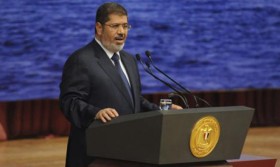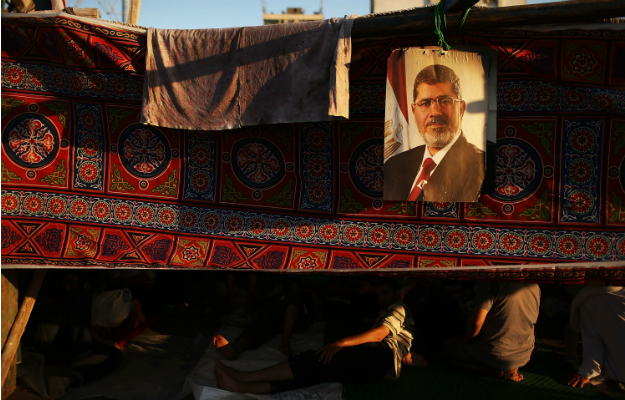 Shortly after Mohamed Morsy’s ouster as president of Egypt, his ambassador to the United States — in a remarkable display of political flexibility — appeared on American television to explain that his boss had been overthrown because he “failed to be the president of all Egyptians.” This notion, that Morsy was removed because he pursued a narrowly Islamizing agenda and failed to include liberals in his cabinet, has become something of the conventional wisdom. For example, Thomas Friedman chided the former Egyptian president for having ruled in a “majoritarian” fashion, running roughshod over his liberal opponents, Islamizing the state, and putting the squeeze on critics like the satirist Bassem Youssef. In this telling, what we saw on June 30 was a replay of what we saw on January 25, 2011 — a revolution by liberals intent on establishing a free and democratic Egypt.
Shortly after Mohamed Morsy’s ouster as president of Egypt, his ambassador to the United States — in a remarkable display of political flexibility — appeared on American television to explain that his boss had been overthrown because he “failed to be the president of all Egyptians.” This notion, that Morsy was removed because he pursued a narrowly Islamizing agenda and failed to include liberals in his cabinet, has become something of the conventional wisdom. For example, Thomas Friedman chided the former Egyptian president for having ruled in a “majoritarian” fashion, running roughshod over his liberal opponents, Islamizing the state, and putting the squeeze on critics like the satirist Bassem Youssef. In this telling, what we saw on June 30 was a replay of what we saw on January 25, 2011 — a revolution by liberals intent on establishing a free and democratic Egypt.
Though there is some truth to this narrative, June 30 was less a revolution than a counter-revolution, carried out not by the photogenic young people who made Tahrir Square a household name two-and-a-half years ago, but by the orphans of the regime that those young people had overthrown. Morsy’s sin was not that he sought to Islamize the state — Hosni Mubarak had done a pretty good job of that himself, and the temporary constitution issued by the new interim government includes all of the shariah-talk that liberals supposedly found so objectionable. It wasn’t even that it tried to exclude liberals like Hamdeen Sabahi and Mohamed ElBaradei from governing. According to Sabahi himself, Morsy offered him the vice presidency shortly after coming to power last year. And although ElBaradei has just been named vice president for international affairs, it’s safe to assume that the number of protesters who took to the streets to put this widely (if unfairly) maligned man in government is vanishingly small.
No, the sin of the Muslim Brotherhood was not that it failed to work with liberals, but that it failed to work with the old regime. For the almost the entirety of its time in power, the Brotherhood has demonstrated a remorseless, unyielding obsession with rooting out Mubarak’s National Democratic Party from Egypt’s political life. This extent of the obsession was on full display in one of the last speeches of Morsy’s presidency. Before a crowd made up of equal parts dignitaries and rowdy Muslim Brothers from the provinces, he railed against the remnants of the ancien regime — commonly called the fulul — and then took a few minutes to tell an unflattering story about a man named Kamal el-Shazly, who was Mubarak’s parliamentary enforcer — and who has been dead since 2010. This odd detour into what is now ancient history reveals the extent to which Morsy and his Brothers viewed as Egypt’s primary problem as not the crumbling of its economy or the decay in public order, but the continued presence of Mubarak’s allies and appointees in almost every corner of the state apparatus. “One year is enough,” the president declared, suggesting that the gloves were soon to come off and a full-blown purge was in the offing. In the end, he was the one who was purged.
The Brothers were not alone in their obsession with the NDP. During the 2011 revolution, the youth of Tahrir made a grand bonfire of the ruling party’s headquarters, and in the months after January 25, 2011, practically all of Egypt at least paid a healthy lip service to the need to banish the fulul. Though the NDP made a game attempt to regroup in the weeks after Mubarak’s resignation, these attempts were cut short in April 2011, when a court dissolved the NDP and ordered the state to seize its assets, ruling — in a questionable bit of legal reasoning — that the fall of the regime “by necessity entails the fall of the instruments through which it wielded power.”
But the dissolution of the old ruling party was not enough for the Brotherhood; its ashes had to be scattered to the winds. And the military, concerned only with maintaining its narrow prerogatives, assented. Prior to the 2012 presidential elections, the Islamist-dominated legislature amended the law on the exercise of political rights. That law lists several categories of people who do not have the right to vote or run for office — prisoners, the mentally ill, the bankrupt. Islamists added a fourth, almost comically specific, category: “Everyone who has in the ten years prior to February 11, 2011, worked as president of the republic or his vice president or prime minister or president of the dissolved NDP or its secretary general or was a member of its political office or general secretariat.” The bill was rejected by the courts, clearing the way for Mubarak’s last prime minister, Ahmed Shafiq, to run for president. If the Brothers took a lesson from Shafiq’s surprisingly strong showing in that election — he lost to Morsy by only a couple of percentage points — it was not that the satraps of the old regime must be accommodated, but that they must be crushed.

